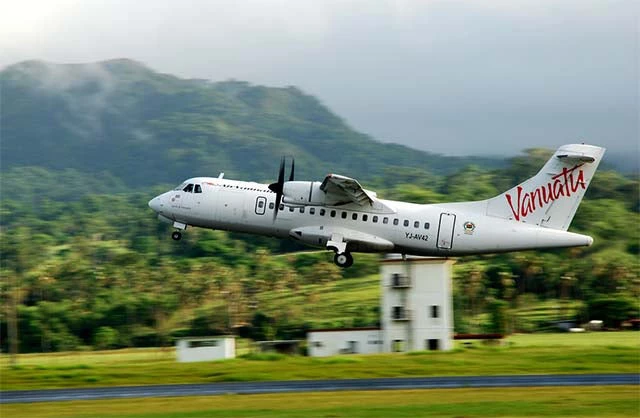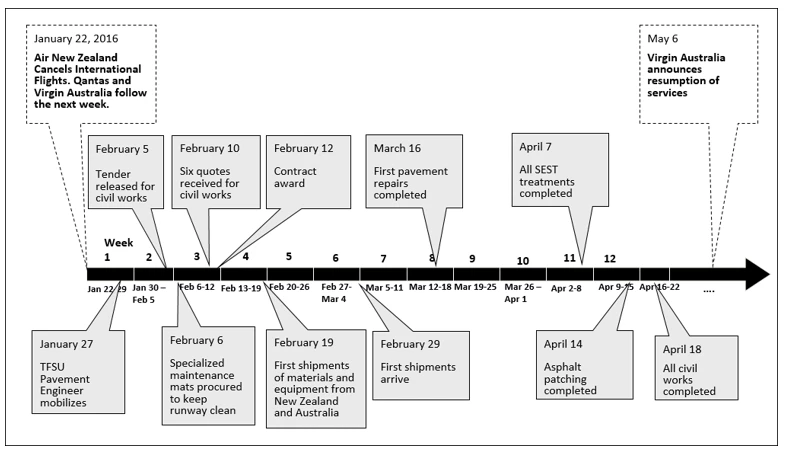
Overjoyed at the emergency rehabilitation of Bauerfield International Airport, Vanuatu’s gateway for travelers, Linda Kalpoi, the general manager of the Vauatu Tourism Office, was in buoyant spirits as she attended the May 6 ceremony announcing the repair’s completion.
Vanuatu yearned for good news. Still recovering from Cyclone Pam’s devastation in March 2015, it was hit by political turmoil after the unprecedented conviction of 14 members of Parliament in October 2015. Then, on January 22, 2016 – the same day Ni-Vanuatu citizens were casting ballots for a snap election – Air New Zealand suspended flights due to safety concerns over the runway condition. Qantas and Virgin Australia followed suit a week later. With only a few airlines still operating, the country lost a sizeable chunk of international tourists.
Airport planning in Vanuatu has long been fraught with differing opinions and priorities. Multiple governments with conflicting visions for developing international air transport, as well frequent changes to the staff and leadership of Airports Vanuatu Ltd (AVL), had left the runway in critical need of repair.
It was in this context that the World Bank Group partnered with Vanuatu, approving a US$59.5 million credit in May 2015 to fund the Vanuatu Aviation Investment Project (VAIP). As part of the Pacific Aviation Infrastructure Program (PAIP) – also being implemented by Kiribati, Samoa, Tonga and Tuvalu – the project draws upon regional implementation arrangements that offer sectoral, procurement and project-management expertise through the PAIP Technical and Fiduciary Services Unit (TFSU).
Urgent repairs were needed to get flights to resume as quickly as possible. AVL started sweeping the runway’s pavements every day, and it sealed major cracks in the surface. Specialized maintenance mats, purchased on an emergency basis, were used to help the surface-sweeping to remove foreign objects and debris, which can damage aircraft and can cause accidents.
Pavement expertise provided by TFSU was in-country by January 27, and the team prepared the specifications for the “surface enrichment sprayed treatment” and cold-mix asphalt repairs. Supported by Bank policies that encourage streamlined procurement procedures in emergencies, the Vanuatu Project Management Unit (VPMU) put out a tender for emergency works to 11 contractors from four countries on February 5. Quotes from six contractors arrived by February 10. Fulton Hogan of New Zealand was awarded the contract on February 12, presenting the most efficient work plan with the lowest price: about US$1.24 million.
Over the next two months, Fulton Hogan was able to complete the work, revitalizing the existing asphalt surface and replacing select areas with cold-mix patches. The work progressed as scheduled, despite minor delays due to Cyclone Winston, which affected the shipment of materials from Fiji.
With Virgin Australia announcing that it would resume services on May 23, 2016, Ms. Kalpoi certainly had a great deal to celebrate during the May 6 opening ceremony.
Lessons learned
- PAIP’s shared-services model enables efficient implementation. PAIP countries consolidate regional expertise and experience in the form of the TSFU. This allows for integrated program management, and the accelerated contracting was possible largely due to the support that it provided. This arrangement has been recognized as part of a Bank-wide competition that focused on the “science of delivery” in Procurement in Complex Situations.
- “Fit for purpose” procurement arrangements were fundamental to delivery. While non-competitive procurement for the emergency works was considered, a comparison of quotes (or “shopping around” for the lowest price) proved to be the most appropriate course of action. The contractor with the lowest price also proposed the most efficient work schedule. The Bank’s procurement policy and procedures allows for flexibile methods to provide fit-for-purpose solutions.
- Collaborating among stakeholders is crucial. Strong engagement across various levels of the government and the Bank, as well as solid coordination among different teams, meant that the implementing agency was able to execute urgent repairs in the shortest possible time.
- Triumphs can be elusive. Much remains to be done. The repairs are only temporary, although they provide an additional window of time to see the design of the major works completed and tendered. Air New Zealand, for instance, is still seeking a long-term solution before resuming airline service.
Tweet these:
Change in (flight) plan: Just three months to fix #Vanuatu’s runway.
World Bank policies encourage streamlined procurement procedures in emergencies.




Join the Conversation